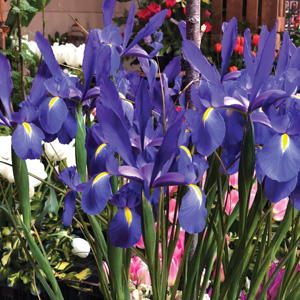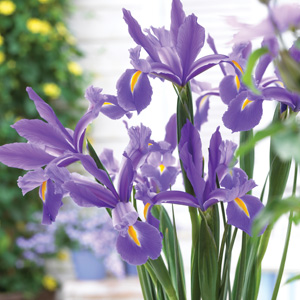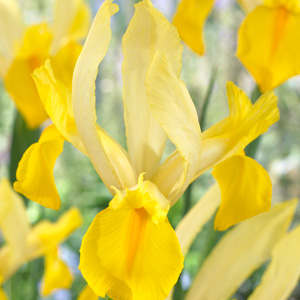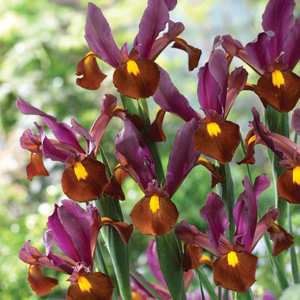Dutch Iris Growing Guide

What is Dutch Iris?
Dutch iris (Iris x hollandica) is a hardy bulbous perennial that comes from the Iridaceae family. This plant has narrow, lance shaped leaves formed in a clump arrangement. In late Spring tall sturdy spikes rise up and produce flowers of blues, mauves, white or yellow. Dutch iris like a full sun position in well drained soil. They are frost hardy. Dutch Iris rot easily if over watered or if the soil they are planted in is poorly drained.
Benefits of Growing Dutch Iris
Dutch Iris are easy to grow with very low maintenance. They are fantastic when planted en masse and are suitable in garden beds or as borders. They are an excellent bulb to grow in the back of garden beds due to their high. Dutch iris are sort after as cut flowers by florists as they make a wonderful cut flower with their long stems and long lasting displays.
How to Grow Dutch Iris
Climatic Zones
Cool to sub tropical. Grows best in cool to cold climates but does tolerate warmer areas.
Plant Size
Height: 50-70cm, Width: 15cm
When To Plant Dutch Iris
Plant in Autumn.
Soil Preparation
Well drained slightly acidic soil. Add broken down manure or compost before planting.
How To Plant Dutch Iris
Plant in full sun with some protection from the wind, 10cm apart with the bulb at a depth of 10cm below the surface. Plant with the pointed end of the bulb facing upwards.
Dutch Iris Plant Care
Water well after planting but don’t water again until foliage emerges. Water weekly during growth and flowering period, but once it starts to die down stop watering. Don’t over water as dutch iris rot easily.
If the soil has been well prepared fertilising isn’t necessary. If soil is of poor quality blood and bone can be applied after foliage begins to appear.
Bulbs may be left undisturbed for years. If you do wish to divide or move these bulbs, wait until the foliage has died back in Summer for best results. Store in a warm and airy position until planting out the next season.
Once the plant has finished flowering leave the foliage as it will continue to gather energy for the next season. Once the foliage begins to yellow and die this is the time to remove the foliage as the bulb goes into dormancy.
Watch for aphids and spray with insecticide if necessary. Also be careful for snails and slugs.










